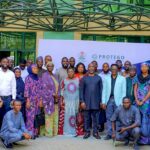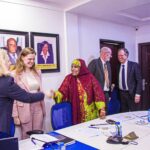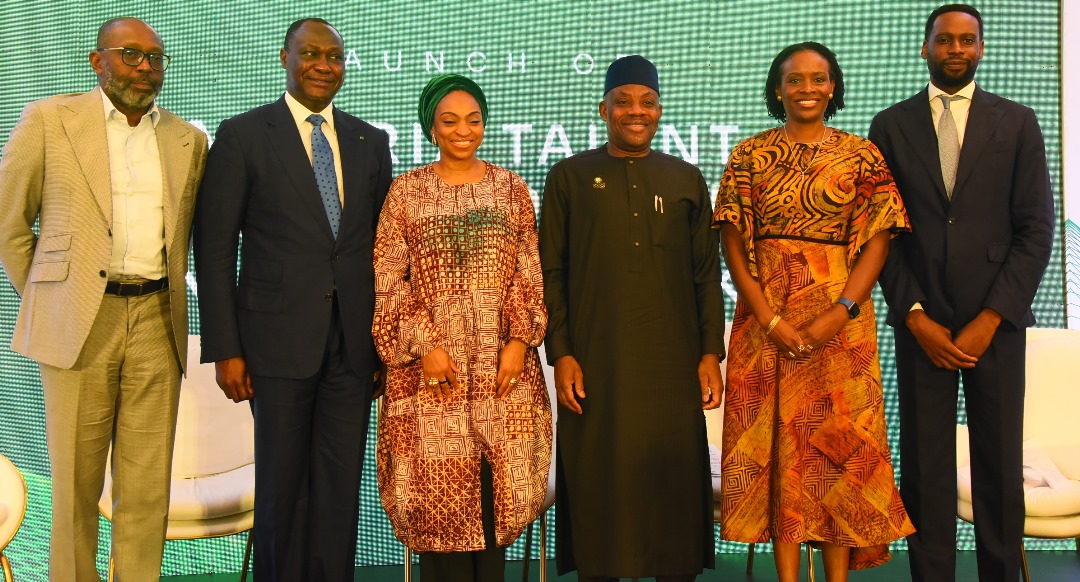By Stellamaris Ashinze
The Federal Government has officially inaugurated the Nigeria Talent Accelerator Network, an initiative aimed at strengthening the nation’s workforce capabilities, addressing critical productivity gaps and accelerating digital transformation.
The Minister of Industry, Trade and Investment, Dr Jumoke Oduwole, said at the inauguration on Wednesday in Lagos that the initiative was part of the World Economic Forum’s Reskilling Revolution in Nigeria.
She said that the initiative was co-chaired by the Federal Ministry of Industry, Trade and Investment, the Federal Ministry of Education, and coordinated by the National Talent Export Programme (NATEP), marking Nigeria’s entry into the Global Accelerators Network.
Oduwole described the inauguration as a decisive step towards building a globally competitive workforce that could power the next phase of Nigeria’s industrialisation and innovation.
“The Nigeria Talent Accelerator Network represents a turning point in connecting policy, industry, and education.
“It will create a unified platform for driving employability, productivity, and inclusive economic growth,” Oduwole said.
Also, the Minister of Education, Dr Maruf Alausa, speaking during the launch, reaffirmed the Ministry’s dedication to aligning education and vocational training with labour market needs.
Alausa said the initiative would ensure that Nigerian youths are equipped with future ready skills and are competitive globally.
He said that the Accelerator would serve as a platform for collaboration among government agencies, private sector leaders, academic institutions, and civil society.
According to him, together stakeholders will co-create scalable solutions to reskill and upskill the Nigerian workforce.
“This initiative will also align national education and employment policies with the demands of the modern economy,” Alausa noted.
The National Coordinator, National Talent Export Programme (NATEP), Teju Abisoye, said that through this collaboration, Nigeria was not only preparing for the future of work but also helping to define it.
Abisoye said that stakeholders are developing a coordinated action plan to address the talent gaps and leverage the huge opportunities for talent export.
She said that the initiative would prioritise the development of digital and transferable skills to support emerging sectors such as technology, business process outsourcing, and green industries.
According to her, it will also focus on mobilising public private partnerships to fund and scale reskilling programmes, enabling workforce redeployment into high-demand roles.
“It will also build data-driven systems to anticipate future skills needs and inform responsive policymaking,’’ Abisoye said.
Saadia Zahidi, Managing Director, World Economic Forum, welcomed the launch, saying that the World Economic Forum was pleased to collaborate with Nigeria on advancing its skills development and workforce readiness.
Zahidi said that this initiative reflected shared commitment to equip individuals with the capabilities needed to thrive in a rapidly changing global economy.
According to Zahidi, by investing in human capital, Nigeria is positioning itself not only to meet domestic workforce needs but also to contribute talent and innovation to the global economy.
“Nigeria’s participation in this global initiative underscored its commitment to strengthening human capital development.
“Promoting digital inclusion, and positioning the nation as a competitive talent hub for Africa and the world.
“The Accelerator complements ongoing national reforms aimed at diversifying the economy, deepening innovation capacity, and driving broad-based prosperity,’’ she stressed.
She added that the Reskilling Revolution was a World Economic Forum initiative aimed at providing better education, skills, and economic opportunities to one billion people by 2030.
According to her, it will bring together global businesses, governments and learning institutions to drive national transformation through programmes such as Skills and Education Accelerators and the Reskilling Revolution Champions and Commitments.
The platform aims at mobilising multi-stakeholder partnerships to work collectively and reshape global talent development, empowering local talent to meet emerging economic realities. (NAN)(www.nannews.ng)
Edited by Christiana Fadare












